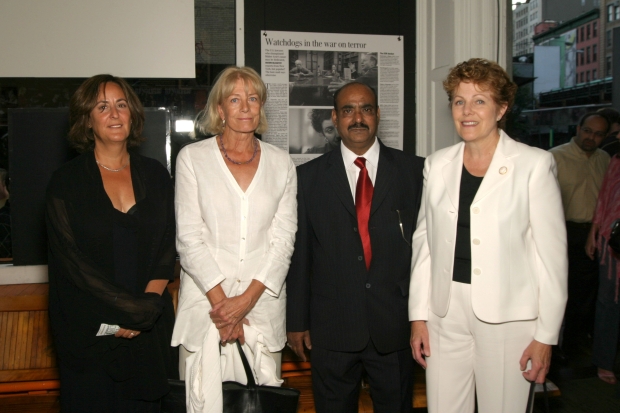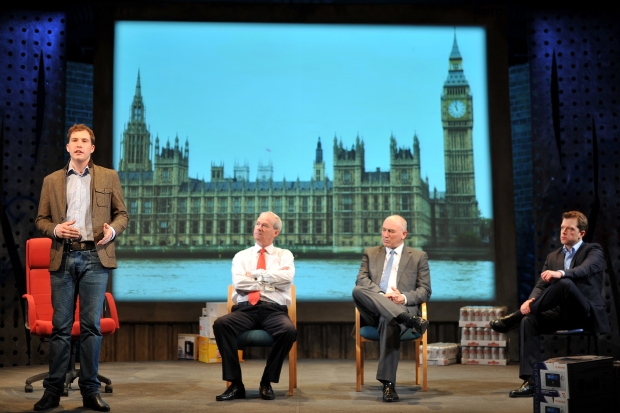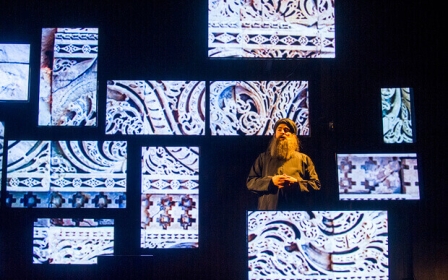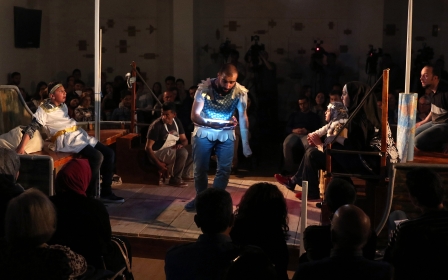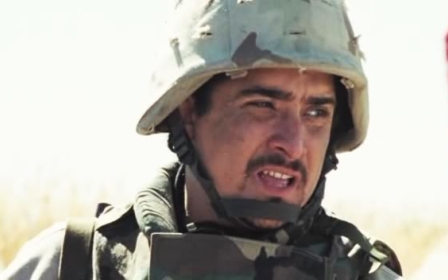Gillian Slovo: The art of questioning
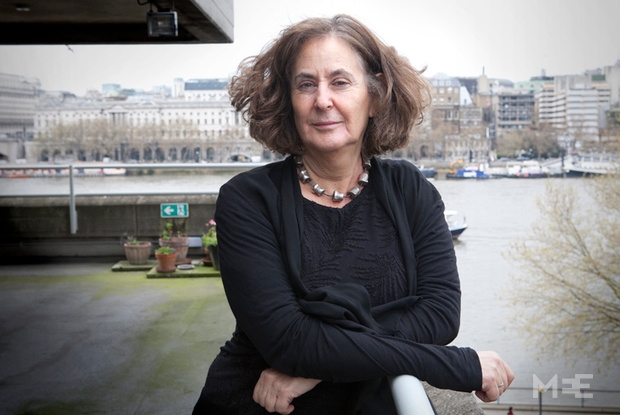
LONDON - “I never asked him why he went, but perhaps it’s the fact that he’s never felt at home here and that there are lots of young people who’ve gone there so he thinks: they need me.” A mother reflects on the reasons that led her son to go and join the Islamic State (IS) group in Syria. She concludes: “And the fact that they see the (anti-IS) coalition as being totally against one country, against one religion, I mean, that’s very important. I think that’s what it is.”
This is one of the issues examined by South African novelist and playwright Gillian Slovo in her latest play, Another World: Losing Our Children to Islamic State, a documentary drama about the origins and appeal of the militant organisation to young Westerners and our response to the threat it poses to us.
According to the a recent report conducted by the Soufan Group, there are more than 27,000 foreign fighters in Syria and Iraq, around 5,000 of them from Europe.
As she did before, Slovo returns to the stage with a piece based on verbatim interviews, a genre she has used in her previous two plays where actors recount the testimony given by the interviewees to convey the immediacy and honesty of the message. Her third collaboration with artistic director Nicholas Kent, developed from his original idea, is yet another politically charged controversial production.
With an accent deeply rooted in her South African childhood, despite having lived in the UK for more than 50 years, the playwright receives Middle East Eye in a small quiet room overlooking the River Thames at the top of the National Theatre. Her words are accompanied by the gentle movement of her hands as if reinforcing her convictions.
Approaching controversial subjects
Slovo admits the scale of the subjects she tackles on stage makes them slightly daunting. “Would we be able to cover it? Would we find the right people to talk about it?” were the first questions that sprang to mind when she got the phone call from Kent to suggest they did Another World. But alongside the initial fear was the excitement at the opportunity given to talk to people who could help in the understanding of a complex subject constantly in the news without much context.
She spoke to around 45 people in order to collate a whole spectrum of views, from former jihadists, researchers, lawyers, authorities from counter-terrorism policing, school students, the former Guantanamo detainee Moazzam Begg and a group of seven Belgian mothers from Molenbeek who had lost their children to the Islamic State. Some reviews, including the one published on MEE, highlight the lack of opinions of the radicalised themselves, although acknowledging the difficulty in accessing these voices.
Not all the interviewees are in the play but “they are all part of it,” she explains.
Lessons from Guantanamo
The anonymous teenagers affected by radicalisation express illuminating comments about being ostracised by the way they look or dress. The consequences of marginalising people on the basis of what they wear or what they say is very dangerous, warns Slovo. “The actions of al-Qaeda or Islamic State can force our governments, and some of us, to give up on some of the hard-won democratic rights which is what makes us different from them. I’m talking about all sorts of things, freedom of expression being one of the most important ones.”
This is something she feels very strongly about particularly since she did her first play Guantanamo: Honour Bound to Defend Freedom in 2004. “If our response is to stop people in our societies from saying things they don’t want us to say, we are falling into their trap. They are interested in polarising, in making our society turn against itself. And I think that is what we need to resist,” she argues.
A look at the figures shows that the tendency towards that polarisation is growing fast. Islamophobic crime in London has gone up by 45 percent in the last year according to the Metropolitan Police while the rise of far-right ideology is emerging across Europe.
So how has Prevent, the British government’s strategy to stop people at risk of being radicalised, been doing? “It has gone too far. In making it a duty of teachers, social workers and doctors to report anything that they consider to be radicalised behaviour at the same time as giving people the most basic of training on how to recognise radicalised behaviour I think is creating a feeling amongst the Muslim population that they are being watched.”
Even the teenagers that agreed to speak to Slovo for the play worried that the research they did on their computers in preparation for the interviews might get them into trouble. These concerns are also incorporated into the play for the audience to reflect on, as is the fact that one of the mothers found out later on that her son had come out of Syria and participated in the Paris attacks.
For the monumental task of editing the vast amount of material without creating a dry disquisition on the subject, Slovo always applies a simple rule. What she learns from talking to people that makes her think differently about the subject is often what she uses in the plays. “If it did it for me it could do it for other members of the audience.” And she adds: “My challenge is to take a serious subject that has worldwide ramifications and render it on stage in a way that people might want to watch it.”
Guantanamo certainly achieved this. The play that turned the spotlight on the human stories behind the headlines about detainees imprisoned without trial, the abuse of international law and the right to national security became an international success and travelled to Broadway after closing in London. “Now it looks easy to know where Guantanamo fits because of what has happened. Even the president of the US thinks it is wrong and wants to close it, but at the time we were doing it that wasn’t the general feeling. People did say ‘Well, these are terrorists and what are you supposed to do with them?’ It is always difficult to take on a serious subject,” Slovo says.
After Guantanamo, Slovo took on another political hot potato, with the acclaimed verbatim work The Riots. Three months after the looting and mob violence that erupted across England in August 2011, Slovo and Kent put together a documentary drama based on a wide range of opinions to explore the events and the possible causes that led to the events.
In both The Riots and Another World the individual voices talk about a collective problem, the disenfranchisement of a large proportion of the young population in Western societies. “One of the answers that came up (when working on The Riots) was that they didn’t have enough in their lives to stop them from going out and destroying,” Slovo says. “In the same way, one of the things in common from these very different people who went to Islamic State is the feeling that they don’t know where they belong, they are looking for a sense of belonging and they wrongly think they will only find that in this mythical caliphate that they think has been established.”
Appealing propaganda
Anyone feeling vulnerable can feel attracted to the “idealistic world,” as Slovo describes it, promised by Islamic State. The author believes extremist propaganda is “incredibly strong” and as an example she recalls an IS video about the well-known pressures women endure in “democratic societies” to “show off their bodies”.
“The problem is that it’s all fake because they only respect women’s bodies by restricting them to the house and forcing them to cover up, which is not the same as someone choosing to cover up.” Further, she says, it appears that the appeal is not so much the religious rhetoric but the promise of an alternative to capitalism.
Her view is informed by many interviews with experts who told her that “many kids don’t know enough about religion” to “understand the fakery that is involved in this”. That is why, Slovo says, she is in favour of bringing the political debate into mosques, to have an open discussion that prevents young people from going underground in search of answers and into the hands of those who are not scared of talking - the radicalisers.
The cost of committing to a cause
As the daughter of anti-apartheid campaigners Joe Slovo, a prominent figure in the South African Communist Party, and Ruth First, a fearless journalist killed in 1982 by a letter bomb for her outspoken opposition to the regime, Slovo paid the price of having parents totally committed to the cause with a disrupted and traumatic childhood full of secrets neither Slovo nor her two sisters were granted access to, arrests, raids and the constant fear that something terrible would happen to her parents.
There is not a hint of resentment when she talks about her parents, but deep love and admiration. “As a child or young adult it was too difficult for me to face the cost because that would be like rejecting what they did, and it was quite clear that what they did was very heroic. They were one of the very few white people who actually put their lives to the right side of that struggle, who chose not to close their eyes. It took me much longer, and a little bit of psychoanalysis, to be able to understand that what my parents did was wonderful and at the same time was at a great cost to their children.”
She was 12 when the family moved to London, where she got some sense of the normality she had craved in Johannesburg. Adapting to life in England took a long time but the process, she thinks, was not about her particular upbringing, but the same challenge faced by anyone moving country and continent.
When her father died of cancer in 1995, Nelson Mandela was the first person to visit the family to pay his condolences. Slovo remembers that around 4 o’clock in the morning he told them how one of his daughters reproached him once for being “a father to the nation,” but not to her. Mandela acknowledged that it had affected that entire generation of activists who followed their convictions. “Actually, I think it was the right thing for them to do. They changed the world for the better, they changed South Africa,” she recalls him saying to them.
The responsibility of writing
The need to understand who her parents really were drove her to write a memoir, Every Secret Thing: My Life, My Country (1997). That caused a confrontation with her father, who did not want her to do it, as well as with family friends, who thought that by exposing her parents’ difficulties she was providing ammunition to their critics. “When you write a memoir you have to think about your responsibility to your audience that you’d be completely honest, and to people in your life. Your honesty is going to affect them.”
Her father did not live to see the memoir published, but most of the friends changed their minds. “What made my parents heroic was that they were actually not heroes, but normal human beings who made their own choices and had some difficulties. To be able to talk about that is to be able to talk about what a real political struggle is about.”
With 13 novels published including Ice Road, Red Dust and her latest Ten Days, it was her mother who planted the seeds of her love for writing in her. “She taught us that writing was a suitable job for a woman.” In fact, her older sister Shawn is a screenwriter and her younger sister Robyn works in fiction as a film producer.
Slovo does not claim she can change the world, but believes that literature and drama can have an impact on individuals when it allows them to “ask questions that they might not be asking of themselves” because as she says, it is “a way of expanding the conversation and the understanding".
New MEE newsletter: Jerusalem Dispatch
Sign up to get the latest insights and analysis on Israel-Palestine, alongside Turkey Unpacked and other MEE newsletters
Middle East Eye delivers independent and unrivalled coverage and analysis of the Middle East, North Africa and beyond. To learn more about republishing this content and the associated fees, please fill out this form. More about MEE can be found here.


